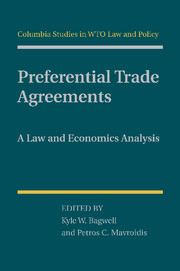Book contents
- Frontmatter
- Contents
- Contributors
- Introduction: The Law and Economics of Contingent Protection
- 1 Preferential Trading Agreements: Friend or Foe?
- The “Legalization” of GATT Article XXIV – Can Foes Become Friends?
- 2 Third-Country Effects of Regional Trade Agreements
- 3 Contingent Protection Rules in Regional Trade Agreements
- 3.1 Commentary on “Contingent Protection Rules in Regional Trade Agreements”
- 4 The Limits of PTAs
- 5 EU and U.S. Preferential Trade Agreements: Deepening or Widening of WTO Commitments
- Straightening the Spaghetti Bowl
- 5.1 Comments on “Beyond the WTO? Coverage and Legal Inflation in EU and U.S. Preferential Trade Agreements”
- 6 Labor Clauses in EU Preferential Trade Agreements – An Analysis of the Cotonou Partnership Agreement
- 7 Do PTAs Actually Increase Parties' Services Trade?
- 8 A Model Article XXIV: Are There Realistic Possibilities to Improve It?
- 8.1 Comments on “A Model Article XXIV: Are There Realistic Possibilities to Improve It?”
- Index
- References
5.1 - Comments on “Beyond the WTO? Coverage and Legal Inflation in EU and U.S. Preferential Trade Agreements”
Published online by Cambridge University Press: 03 May 2011
- Frontmatter
- Contents
- Contributors
- Introduction: The Law and Economics of Contingent Protection
- 1 Preferential Trading Agreements: Friend or Foe?
- The “Legalization” of GATT Article XXIV – Can Foes Become Friends?
- 2 Third-Country Effects of Regional Trade Agreements
- 3 Contingent Protection Rules in Regional Trade Agreements
- 3.1 Commentary on “Contingent Protection Rules in Regional Trade Agreements”
- 4 The Limits of PTAs
- 5 EU and U.S. Preferential Trade Agreements: Deepening or Widening of WTO Commitments
- Straightening the Spaghetti Bowl
- 5.1 Comments on “Beyond the WTO? Coverage and Legal Inflation in EU and U.S. Preferential Trade Agreements”
- 6 Labor Clauses in EU Preferential Trade Agreements – An Analysis of the Cotonou Partnership Agreement
- 7 Do PTAs Actually Increase Parties' Services Trade?
- 8 A Model Article XXIV: Are There Realistic Possibilities to Improve It?
- 8.1 Comments on “A Model Article XXIV: Are There Realistic Possibilities to Improve It?”
- Index
- References
Summary
According to the WTO, in July 2007 there were about 205 preferential trade agreements (PTAs) in force and by 2010 no fewer than 400 PTAs are expected to be implemented. This wave of PTAs, which started in the 1990s, is unprecedented both in terms of the number of countries and the breadth of issues they cover. Therefore it is imperative to get the basic facts about these agreements straight before we draw normative conclusions and make any detailed policy prescriptions. The paper by Horn, Mavroidis, and Sapir provides an excellent first step in this direction. The authors provide a careful and systematic classification of the policy areas covered by the reciprocal PTAs of the United States and European Union (EU) as well as the extent of their legal enforceability.
The areas are usefully divided into ones that are covered in some way in the WTO (WTO+) and those that are currently excluded from it (WTO-X). The main findings are the following. First, the obligations in WTO+ areas contained in these PTAs are often similar to the obligations in the WTO itself. Second, there are thirty-eight distinct WTO-X areas but only about eight appear to be legally enforceable. These are typically related to Intellectual Property, Investment, and Movement of Capital (both in U.S. and EU PTAs); Competition and Social Matters (EU); and Anti-Corruption, Environment, and Labor (U.S.).
- Type
- Chapter
- Information
- Preferential Trade AgreementsA Law and Economics Analysis, pp. 175 - 179Publisher: Cambridge University PressPrint publication year: 2011
References
- 1
- Cited by



